Good day students, how are you all doing ? continue to stay safe in Jesus mighty name. Amen.
Lets continue with our question and answer.
- The right to vote and be voted for is called —– a. election b. campaign c. franchise d. constitution
- The arm of government that implements and enforces the law is —– a. The Senate b. The Executive c. The Legislative d. The Judiciary
- Nigeria became a republican state in —– a. 1960 b. 1914 c. 1963 d. 1919
- Which of the following countries speaks English as the official language ? a. Togo b. Mali c. Benin republic d. Liberia
- Corruption, bribry, tribalism, lateness to work are forms of ————- a. dedication b. discipline c. cooperation d. indiscipline
- The practice of worshipping only one God is known as —- a. polytheism b. Christianity c. hypotheism d. monotheism
- The process by which water is diverted to a farm to improve the quality of soil and crop production is ——- a. drainage b. swamping c. watering d. irrigation
- What is the minimum voting age in Nigeria ? a. 15 years b. 18 years c. 20 years d. 25 years
- The Nigerian flag, currency, coat of arms and the Nigerian passport are some of our —– a. heritage b. national symbols c. heroes d. educational system
- In which country of West African was the first institution of higher learning established ? a. Nigeria b. Liberia c. Gambia d. Sierra-Leone
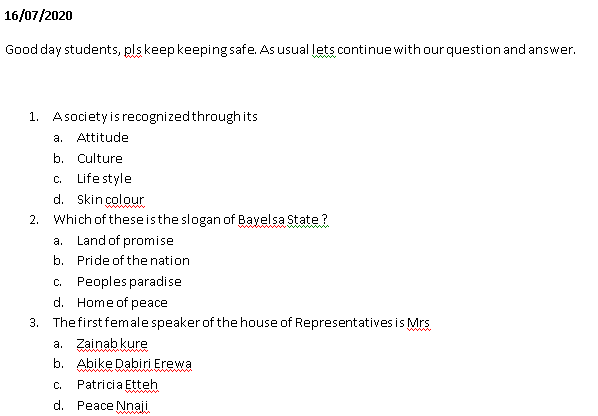
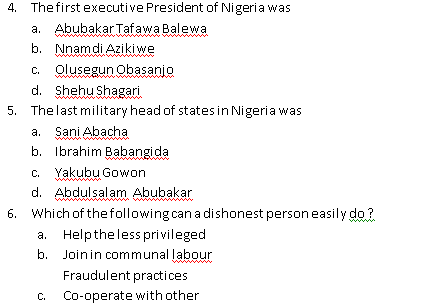
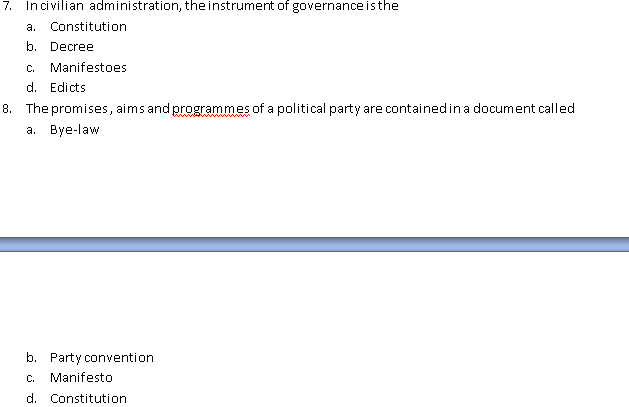
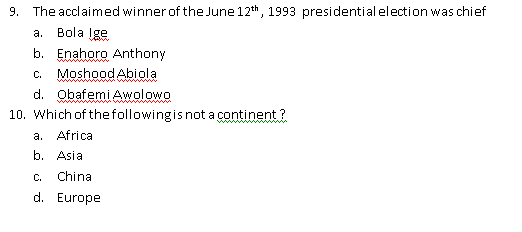
2/07/2020
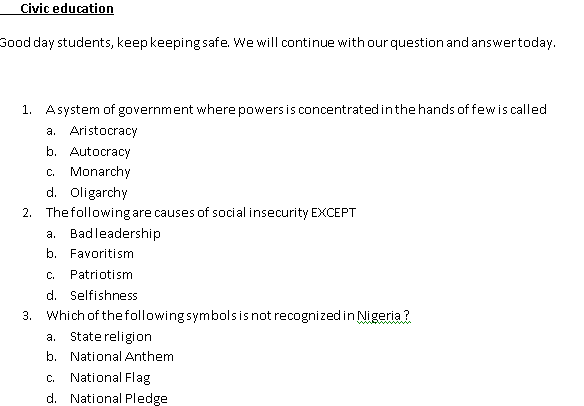
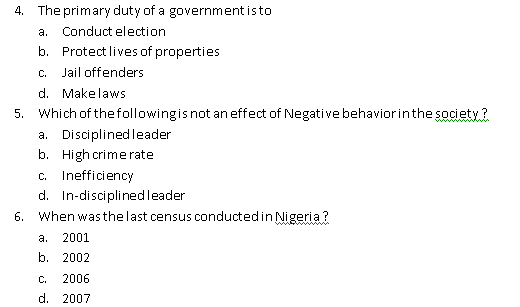
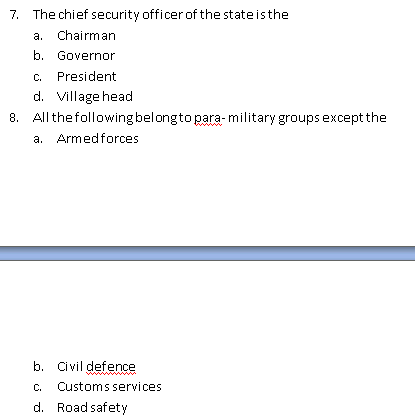
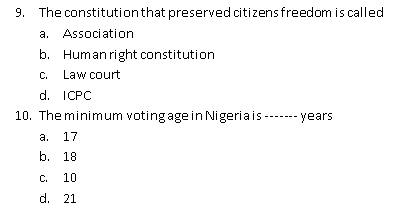
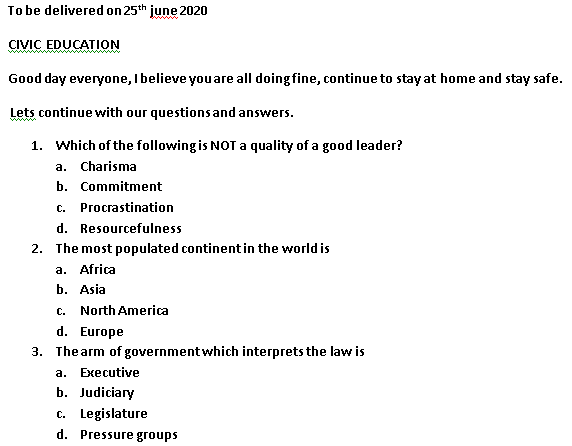
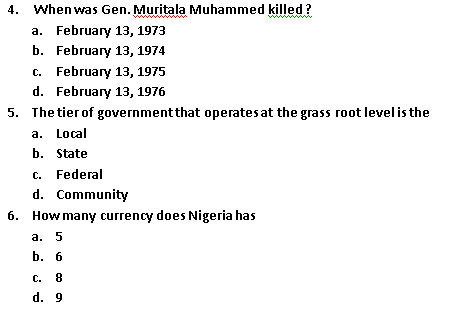
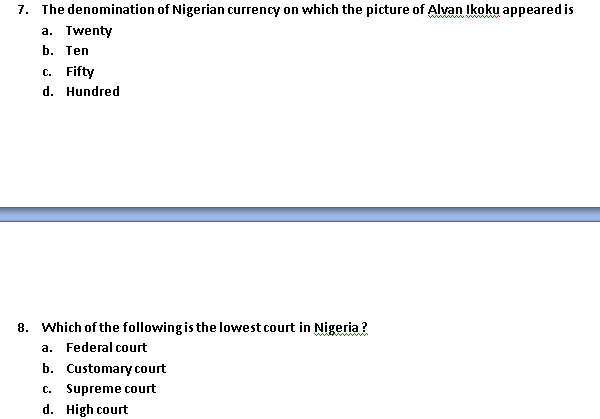
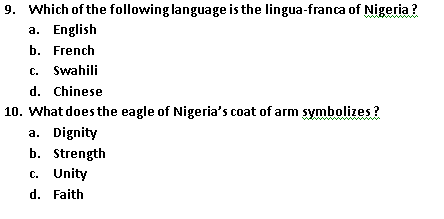
To be delivered on 18th JUNE 2020
Good day students, hope you are all doing fine ? please stay at home and stay safe.
Today will be questions to be answered. So lets start ;
- The study of man in his physical and social environment is called ———
- Economics
- Geography
- History
- Social studies
- Sociology
- Social studies defines the environment as a /an——–
- Area occupy by animals
- Area where aquatic habitat lives
- Place where man cultivate
- Place where man relates with others
- Totality of man’s surrounding
- The religious theory about the origin of man believes that man is a product of ——-
- Creation
- Evolution
- Reformation
- Revolution
- Species
- The following are example of secondary social group
- Churches
- Family
- Pressure groups
- Political parties
- Students union
- Which of these is positive social behavior ?
- Dishonesty
- Sincerity
- Stealing
- Truancy
- Wickedness
- A body of water surrounded by land is called
- Highland
- Island
- Lake
- Plateau
- Upland
- An instrument used in measuring the amount of moisture in the air is ——
- Barometer
- Hydrometer
- Thermometer
- Rain guage
- Wind vane
- A piece of land surroundedby water is called ——-
- Island
- Lake
- Highland
- Plateau
- Upland
- The first agent of socialization is the ———–
- Community
- Family
- Peer group
- Religious institution
- School
- Which of these is not influenced by culture ?
- Agriculture
- Dressing
- Housing
- Language
- Weather
- Which of these is not an example of social environment ?
- Forest
- Market
- Office
- School
- Village
- Language belongs ———– aspect of culture.
- Communication
- Entertainment
- Material
- Non-material
- Speech
- Which of these is the slogan for Bayelsa state ?
- Land of promise
- Home of all
- Home of peace
- People’s paradise
- Pride of the nation
- A society is recognized through its ——–
- Attitude
- Culture
- Life style
- Skin colour
- Soil
- The process of learning through which a child acquires language, values and beliefs is called ———
- Civilization
- Demobilization
- Indoctrination
- Mobilization
- Socialization
- The following are sexually transmitted related diseases except
- Gonorrhea
- Hepatitis
- HIV/AIDS
- Liver sclerosis
- Syphilis
- Which ofthese social issues does not require force to resolve ?
- Insurgency
- Seccession
- Armed robbery
- Pipeline vandalism
- Unemployment
- The most expensive means of transportation in Nigeria is ——– transportation.
- Air
- Pipeline
- Railway
- Road
- Water
- Movement of people and goods from one place to another is called ——–
- Communication
- Information
- Transformation
- Transformation
- Transmission
- Which of the following is the fastest means of communication ?
- Letter writing
- Radio
- Telephone
- Television
- telex
11/06/2020
Good day class, i believe you are all doing fine. Today’s topic will be questions for you to answer.
QUESTIONS
- A crime is a/an ——- activity.
(a)ordinary (b) lawful
(c) illegal (d) legal
2. An interference with another person’s right to use or enjoy his/her property is termed——–
(a) personal interference (b)property crime
(c) personal crime (d) kidnapping
3. All the following are examples of personal crimes except——-
(a) robberry (b) assault (c) rape (d) kidnapping
4. The crime of forcing someone to have sex by by using violence is called ——
(a) assault (b) theft (c) rape (d) treason
5. The main victims of human trafficking are (a) men (b) men and women
(c) children and parents (d) women and children
6. All the following are hard drugs except
(a) cocaine ( b) panadol
(c) marijuana (d) indian hemp
7. When a valuable constituent of a food is removed or substituted for in part or whole by another thing , it is said to be ——–
(a) rich (b) adulterated
(c) effective (d) illegal
8. All the following should be done to avoid criminal activities in the society except—-
(a) sensitization of the member of the society
(b) making laws to guide against criminal act.
(c) giving gifts to any criminal caught
(d) empowering the law enforcement agencies
No Fields Found.9. The use of violence to achieve political aims is termed ——
(a) terrorism (b) vandalization
(c) arson (d) bunkering
No Fields Found.10. ——— is the illegal use of fire to destroy a house or property.
(a) Arson (b) Terrorism
(c) Bunkering (d) pipeline vandalization
DATE DELIVERED: JUNE 4TH 2020
Hello students, I wish you all the best of this children’s day.
Today’s topic is “National Security” .
It is defined as the effort made by the federal government of Nigeria to guarantee safety of lives and properties. As well as ensuring that people live in a peaceful atmosphere devoid of any form of hinderance by any group or individual.
Roles of citizens in maintaining national security
- Vigilance
- Supplying information
- Law abiding
- Patriotism
- Helping others
- Public awareness
- Supporting the government to rid our society of criminal activities
National security agencies
- Military forces
- Para- military services e.g. NSCDC, FRSC, Customs etc
- Police force
- State Security Services
Crimes that affect national security
- Pipeline vandalization
- Drug trafficking
- Human trafficking
- Illegal bunkering
- Terrorism etc
CLASSWORK
List ten things people can be found guilty and punished.
No Fields Found.CONSTITUTION
This is the body of fundamental law guiding the activities of the ruler and the ruled in a state.
SOURCES OF NIGERIAN CONSTITUTION
- Act of parliament: These are bills passed into laws by members of the legislature.
- Writings of well known lawyers and jurists.
- Judiciary precedence: They are past judgementgiven in a court of law.
- International laws.
- Existing constitution of any country.
- Customs and convention.
- Past experiences .
FEATURES OF NIGERIAN CONSTITUTION
- Preamble: This is the introduction of past history of Nigerian constitution.
- Organs of government.
- Party system.
- Citizen ship
- Structure of the government
- Amendment of the constitution.
- Tenure of office.
- sharing of power.
- Title of the constitution.
ROLE OF THE CITIZEN IN CONSTITUTIONAL DEVELOPMENT
- Presenting papers to the government .
- Voting for representatives
- Standing for election
- Presentation of national assembly.
- Criticism
- Debate and symposium
Assignment
Give short history on Macpherson, Lyttleton and 1999 constitutions.
No Fields Found.